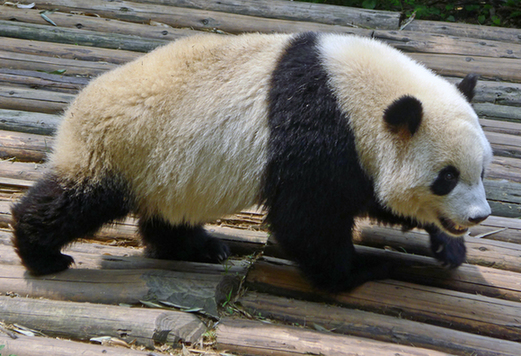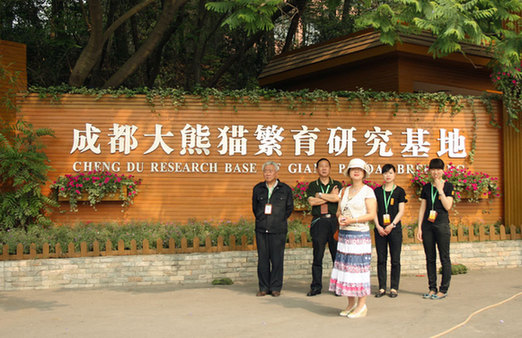Caring for China's Cute and Cuddly – The ultimate job?
- By Iona Orbinski
 0 Comment(s)
0 Comment(s) Print
Print E-mail
Radio86, October 11, 2011
E-mail
Radio86, October 11, 2011
|
Adult panda walking [Photo by Iona Orbinski/Radio 86] |
|
Chengdu panda research base [Photo by Iona Orbinski/Radio 86] |
When you think China, you think panda. No wonder, the Giant Panda is China's most precious animal. It's honoured, loved and respected, even more so than any other animal. This black and white bear even became China's national symbol. Did you ever wonder what it's like to have the responsibility of looking after these cuddly creatures?
In ancient times, pandas were thought to be rare, noble creatures. Native to the central and south part of China, they were a sign of goodwill. Pandas were believed to have magical powers, they could fight off natural disasters and keep away evil spirits.
Today unfortunately, there are only very little pandas left in the wild, and therefore the animal is present on the endangered species list. There are many panda reserves and research centres located across China, all work to preserve, research and even breed this magnificent creature. One of those facilities is the Chengdu Research Base of Giant Panda Breeding. (hereafter called Panda Research Base)
Simply huggable
In the heart of the panda habitat, 10 kilometres outside of Chengdu, Sichuan, the Panda Research Base covers 106 hectares. It's almost entirely green, with scenic hills and huge amounts of bamboo. Here, the ultimate goal is to become a world-class research facility, a conservation education centre, and an international educational tourist destination.
It all started in 1987, with six old and sick pandas. Today, more than one hundred pandas roam the facility. Walking around the different enclosures, one will see them resting, playing, climbing and generally just enjoying life. They are so cute and fluffy, it's hard to resist the urge to jump into the enclosure and cuddle them.
Dedication
However, Yang Kuixin, caretaker at the Panda Research Base, tells us it's a common misconception to think pandas are harmless and huggable. "They are in fact very dangerous, same as a tiger or a lion. Our breeders often get bitten and hurt during their work."
Human contact with the adult pandas is therefore kept to the absolute minimum. "It is forbidden for humans to have direct contact with a panda older than two years old." Yang says, "After the age of two, they are ferocious."
It's different when the cubs are born though. "After a baby is delivered we hardly go home," tells Yang. "We live together with them and take care of them 24 hours a day. We stay here for about 25 days a month. If the cub is for instance delivered in August we have to stay until Spring Festival. (February)"
The ultimate job?
Needless to say, 24-hour care creates an emotional bond between the caretaker and the cub. As there is no such thing as office hours, Yang can be called into work in the middle of the night. "Working as a animal caretaker you have to work according to their schedule, not yours."
"It is hard for us to separate work and personal life. We have to be careful in caring for the panda, but also be brave. Only with this kind of spirit we can manage our job well. Because after all, pandas are predators. Even a one or two year-old panda can hurt you when they are playing with you. And they will not notice it."
Proud
What the panda's will notice, is their caretaker. Though they seem a bit sluggish and clumsy in their movements, they're anything but dumb. They even have human emotions and reactions to their carers.
"When we walk by, they will notice. And if they're hungry they will roar and let you know. If you often play with baby pandas they will like to play with you as well. They have human feelings. But if a stranger gets close to a grown-up panda, especially a pregnant one, they will feel threatened and roar at you."
Personal success story?
Caring for China's cute and cuddly might seem like the ultimate job, but it's hard work. Still, Yang does his job with great pride. He shares one of his many success stories with us.
"In 2008, one panda gave birth to twin panda babies. The first baby was about 170g. The second one was only 51g. The older one's weight was three times that of the other. The first one was very healthy. But the second was very small. It did not even scream. It looked very weak ... "
When it was placed in the incubator, its body temperature was only 34 degrees. This was dangerously low. The panda was dying.
"All our experts and carers worked for one entire week. Its mouth was so small, almost like my pinky. It cannot feed on its mother's milk. We had to feed it with a milk bottle used for feeding mice. It could not swallow either. We had to drop the milk in its mouth and press it closed to make it swallow."
Already after one week of intense nursing, the situation improved. "We gave so much, we hardly slept, only a couple of hours a day. Every hour someone had to take care of the panda and it eventually survived. All that we have given, is worth it. With its 52 grams, it was the lightest panda in the world. It survived and is living healthy now. Even better than it's sister!"
The author is an editor with radio86.com, a Finnish media that provides news about China.
For more information, check out the Chengdu Research Base of Giant Panda Breeding: (http://www.panda.org.cn/english/index.htm)








Go to Forum >>0 Comment(s)